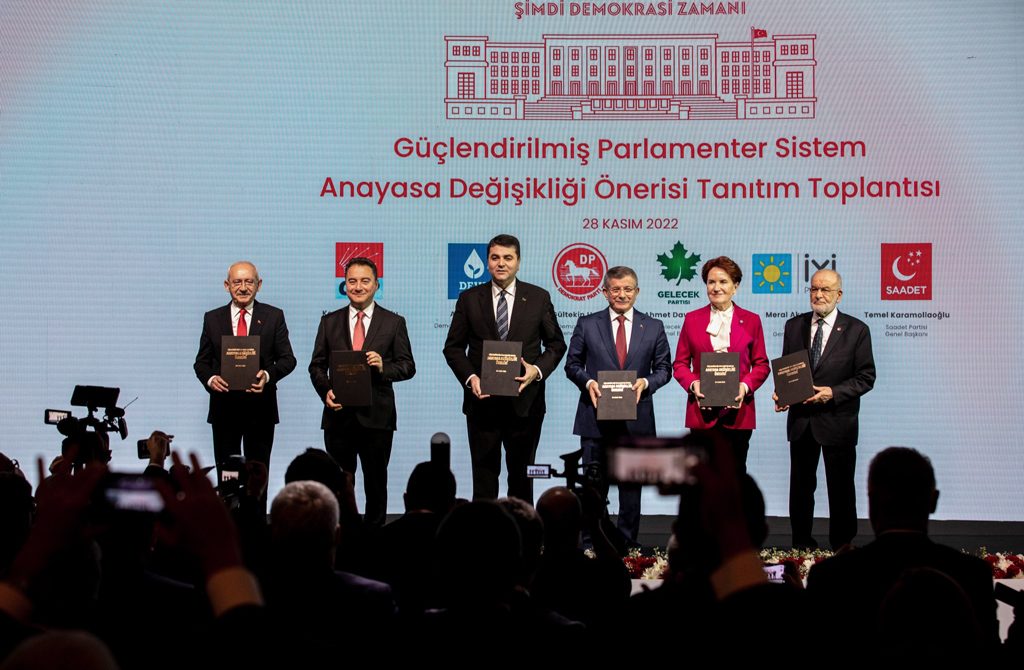The “table for six” unveiled the first of its two proposed systems of government.
Ardent readers of this column will remember how I repeatedly said that the opposition was compelled to call for an “augmented” parliamentary system, yet warned that it would not be enough. Accordingly, I made the case that they must make a proposal for the 2023 presidential election, which will take place under the presidential system.
As such, the opposition parties need to establish how they will share the elected president’s powers under the current system of government to endorse a joint presidential candidate and work together in the parliamentary election.
Indeed, the latter is more important because the opposition knows how difficult it is to control enough parliamentary seats to amend the Constitution.
President Recep Tayyip Erdoğan described the opposition’s proposed system of government as a “freak.” I assume that he will find the opposition’s second plan, which involves new structures like a “coordination council,” far more freakish.
‘Augmented’ parliamentary system
On Nov. 28, the six opposition leaders presented the “augmented” parliamentary system as a proposed constitutional amendment with 84 articles.
Notably, that proposal represented a direct reaction to the presidential system of government. Moreover, its architects appear to have tried to distance themselves from the Turkish-style parliamentary system that the 1982 Constitution had put in place. A public debate on the presidential and parliamentary systems of government would contribute to Türkiye’s democracy.
Still, I believe that the current proposal would fuel a rivalry between the president and the prime minister despite the “founding vote of no confidence.” That is because the people will elect the president, which will be reduced to a symbolic figure in many ways, per the opposition’s proposal.
Would a popularly elected president, who will not be able to engage in politics after their term, settle for a symbolic role for seven years?
Would they not weigh in on various crises that could erupt during that time?
I do not believe that the architects of the opposition’s proposal are unfamiliar with the realities of Turkish politics. It is clear, however, that the “liberal lecture” they received is unrealistic.
The “table for six” made a proposal that threatens to create a fragmented system of political parties, fuel conflict within the executive branch, start a tug-of-war between the executive and legislative branches, and usher in a period of coalition governments.
Its main weaknesses are its reactions to President Erdoğan and its commitment to coming up with a president that the current opposition bloc would like to select. Furthermore, it seems that the opposition parties, which endorse the push for parliamentarianism, will resort to the discourse of “freedom versus one-man rule” on the campaign trail.
I do not expect the People’s Alliance to campaign on stability and leadership alone, which would allow the opposition to talk about democracy. Nor do I think that the proposal for a parliamentary system will be at the heart of the opposition’s campaign. Instead, their point of emphasis will be the second proposal, which relates to the joint presidential candidate and how they plan to bring together the presidential candidate and the opposition leaders.
Freak formulas
Temel Karamollaoğlu, who chairs the Felicity Party (SP), stated on Thursday that the elected president and the six opposition leaders would “govern the country like a coalition government for five years” if the opposition were to claim less than 360 parliamentary seats. He prefers an arrangement, whereby the opposition leaders will enter Parliament – instead of serving as vice presidents, per the main opposition Republican People’s Party (CHP) proposal – and wants the elected president to pledge to govern Türkiye “in consultation with the chairpersons” who would be part of a “coordination council.”
Since that pledge would not be legally binding, however, Karamollaoğlu said that the elected president’s failure to keep their word would amount to a “total lack of character.”
It is important what the remaining opposition parties think about that. Even Karamollaoğlu’s remarks, however, indicate that the “table for six” is prone to coming up with freak formulas to determine how they will share the elected president’s constitutional powers.
In his most recent address to the CHP’s parliamentary caucus, CHP Chairperson Kemal Kılıçdaroğlu announced that they would highlight the system at the expense of the presidential candidate. That emphasis on “the system” either signals that someone other than Kılıçdaroğlu could become the joint presidential candidate or represents an admission of the fact that the opposition won’t field a champion that could compete with Erdoğan.
The main problem, however, is that focusing on the system won’t remedy the opposition’s fragmentation.
At the end of the day, both of the opposition’s “systemic” proposals rest on dysfunctional coalitions.
In this article
- Opinion
- 14 May 2023 Turkish General Election
- 2023 Turkish Presidential Election
- Daily Sabah
- Kemal Kılıçdaroğlu
- Paris Climate Agreement
- Presidential Government System
- Recep Tayyip Erdoğan
- Table for Six | Turkish Opposition Alliance
- Turkish Opposition
- Turkish President
- Türkiye
- Türkiye's 2023 Elections
- Türkiye's Republican People's Party (CHP)
- Türkiye's Republican People’s Party (CHP) Chairperson



